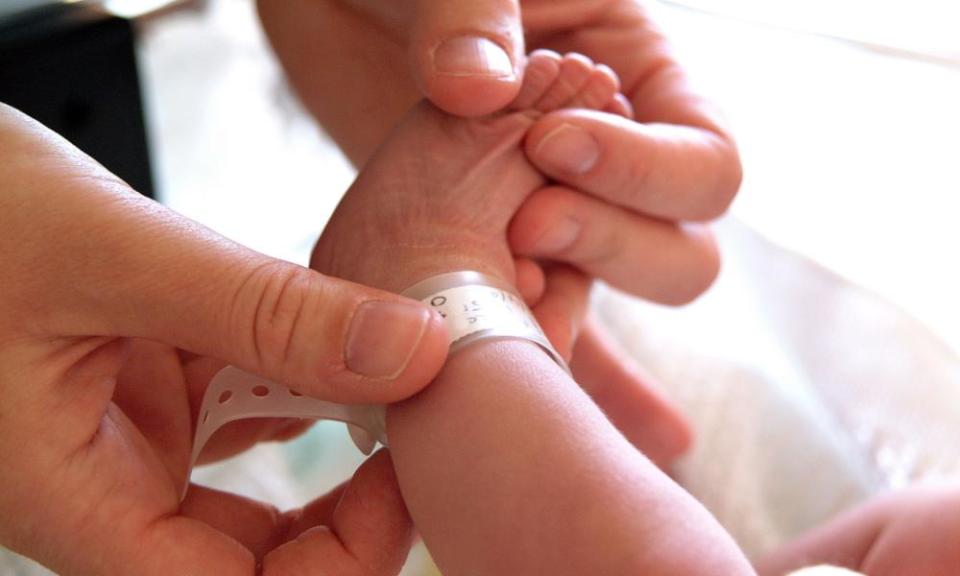Scientists raise concerns over UK baby genome sequencing plan

Exclusive: experts say scheme seems designed to create valuable dataset rather than improve screening
Scientists have raised concerns about a proposed overhaul of newborn screening that could lead to the UK becoming the first country to offer whole-genome sequencing for every baby.
Speaking before the publication of plans for an NHS pilot study in which up to 200,000 babies’ genomes will be sequenced and analysed, scientists suggested the initiative appeared designed to create a valuable health dataset rather than an effective method of improving the diagnosis of rare diseases.
Anneke Lucassen, director of the Centre for Personalised Medicine at the University of Oxford, said that if the primary objective were improving newborn screening, there were alternative, more targeted tests that would be cheaper and potentially more reliable.
Related: What are pros and cons of whole genome sequencing for every UK baby?
“If it was really all about [diagnosing more conditions], you could do that through other means,” she said. “It’s about helping to build the genomics industry in the UK and it’s about creating a research resource so we can study people as they grow older.”
Lucassen said she was not opposed to the pilot, or even necessarily to these objectives, but wanted more transparency, “because otherwise it’s sold as something that is not the full picture”. “The public needs to know that,” she added.
Sequencing the genomes of all newborns would represent a hugely ambitious upgrade to the routine “heel prick” test that all babies receive at about five days to detect nine serious health conditions including cystic fibrosis, sickle cell disease and various metabolic diseases.
The plan has gathered political momentum and was cited in the chancellor’s October budget speech as part of a £5bn commitment to health research, with a suggestion that more than 200 conditions could be screened for.
In the pilot, babies’ genomes and anonymised health data would be added to Genomic England’s research database, which academics and industry scientists can use for pre-competitive research.
Some welcomed the UK’s far-sighted approach to genomics, saying genetic information would inevitably play an increasingly important role in healthcare in the future.
“I think [genomics data] will be an incredibly powerful tool when used in the right way,” said Prof Sir Peter Donnelly, chief executive of Genomics plc and a professor of statistical science at the University of Oxford. “I see the newborn screening programme as one step in that path.”
A public consultation early this year found that the public would be supportive of the plans. However, geneticists are concerned that there has not been sufficient clarity about the potential for more targeted tests of specific genes to work just as well or better.
“If your motivation is simply to improve newborn screening to improve newborn health, this isn’t how you’d do it,” said Prof Caroline Wright, a geneticist at the University of Exeter.
Prof Francesco Muntoni, a paediatric neurologist, said other proposals to expand the number of conditions screened for were being sidelined because the sequencing proposal had become a national flagship project. He said this risked delaying the introduction of tests for conditions such as spinal muscular atrophy, for which new treatments exist that can protect babies before symptoms appear.
There are also questions about the risk of false positives. Until now, whole-genome sequencing has been used to diagnose rare conditions in people with unexplained symptoms. The reverse – predicting disease based on the genome of healthy babies – is a more difficult task, and experts said the more conditions that were screened for, the higher the risk of placing healthy babies on a medical pathway.
One recent trial in California found that genetic sequencing would result in a sixfold increase in false positives for metabolic disorders, compared with the conventional biochemical test.
Donnelly said the greatest healthcare value of such data would be in predicting the risk of common health conditions such as heart disease and diabetes in adulthood. He said there were particular ethical complexities around the consent process for obtaining genomic data in newborn babies. “[These issues] are all much easier when you can ask the individuals directly,” he said.
Simon Wilde, the engagement director for Genomics England, said: “We recognise the uncertainty of knowing what the exact benefits might be, which is why we are doing the research pilot, to gather the evidence. We’ve set out in the vision document the different questions we want to explore in the research pilot, and our planning and research will be led by the public, patients and potential participants in the programme to get this right. We are not rushing into this because we want to do this at the right pace.”

 Yahoo Finance
Yahoo Finance 